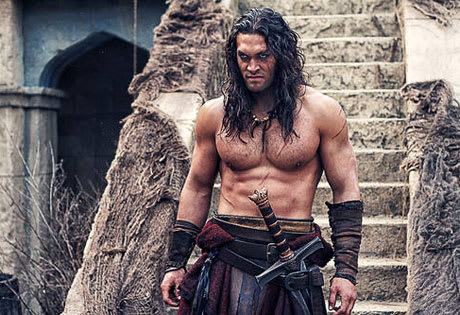About half-an-hour into Conan the Barbarian ― after we've established Conan (Jason Momoa) as a tortured soul on a quest to avenge the weirdly complicated and unlikely death of his father (Ron Perlman) ― he randomly decides to free a bunch of slaves from their masters because, in typical declarative form, "No man should be denied freedom."
After cracking open a bunch of heads and slashing various people in half, he and his merry band of half-naked troglodytes grab several topless slave girls and promptly get drunk. While drinking and delivering some of the worst dialogue ever written (again, all declarative), breasts are visible in every single shot, often in close-up, just over the shoulders of each significant (male) character.
The real clincher is that this sequence has absolutely nothing to do with the plot, which involves the evil Khalar Zim (Stephen Lang) and his magical daughter, with Freddy Krueger razor nails, Marique (Rose McGowan), trying to reassemble an evil mask and drench it in the blood of a comely virginal lass (Rachel Nichols). This scene exists for the simple reason that the sort of audience looking to watch a remake of a conservative male impulse id fantasy like Conan the Barbarian wants to see breasts.
And we get it: boys like boobs. It stems from the need for ample nourishment as an infant and their oft pseudo-incestuous relationship with their mothers. But why does Marcus Nispel focus so intently on cutting breasts with big, phallic swords? Furthermore, why is every shot of a woman being murdered or mutilated depicted with such pornographic, lingering detail when the many deaths of men are almost incidental? And why do women get gagged upon speaking, stabbed in the vagina with razors, have babies ripped from their wombs and bear cleavage more often than their faces?
It seems that Marcus Nispel has the same hatred of women as noted, unstable misogynists like Alexandre Aja. Beyond the constant battle scenes with sand people, tentacle monsters and extras unable to speak properly because of their cheap, fake teeth, this overly simplistic and often laughable ode to economical fantasy is a merely a medium for a disturbingly unstable man to work out his psychological imbalances.
But because of the relentless, often propulsive action, battle sequences and occasionally inspired cinematography, it's possible this unsettling and nauseating reality will be overlooked.
Regardless, beyond camp amusement and a voyeuristic curiosity as to the extent of the gore on screen, there's little to advocate in this embarrassing opus of crude male instinct.
(Maple)After cracking open a bunch of heads and slashing various people in half, he and his merry band of half-naked troglodytes grab several topless slave girls and promptly get drunk. While drinking and delivering some of the worst dialogue ever written (again, all declarative), breasts are visible in every single shot, often in close-up, just over the shoulders of each significant (male) character.
The real clincher is that this sequence has absolutely nothing to do with the plot, which involves the evil Khalar Zim (Stephen Lang) and his magical daughter, with Freddy Krueger razor nails, Marique (Rose McGowan), trying to reassemble an evil mask and drench it in the blood of a comely virginal lass (Rachel Nichols). This scene exists for the simple reason that the sort of audience looking to watch a remake of a conservative male impulse id fantasy like Conan the Barbarian wants to see breasts.
And we get it: boys like boobs. It stems from the need for ample nourishment as an infant and their oft pseudo-incestuous relationship with their mothers. But why does Marcus Nispel focus so intently on cutting breasts with big, phallic swords? Furthermore, why is every shot of a woman being murdered or mutilated depicted with such pornographic, lingering detail when the many deaths of men are almost incidental? And why do women get gagged upon speaking, stabbed in the vagina with razors, have babies ripped from their wombs and bear cleavage more often than their faces?
It seems that Marcus Nispel has the same hatred of women as noted, unstable misogynists like Alexandre Aja. Beyond the constant battle scenes with sand people, tentacle monsters and extras unable to speak properly because of their cheap, fake teeth, this overly simplistic and often laughable ode to economical fantasy is a merely a medium for a disturbingly unstable man to work out his psychological imbalances.
But because of the relentless, often propulsive action, battle sequences and occasionally inspired cinematography, it's possible this unsettling and nauseating reality will be overlooked.
Regardless, beyond camp amusement and a voyeuristic curiosity as to the extent of the gore on screen, there's little to advocate in this embarrassing opus of crude male instinct.
